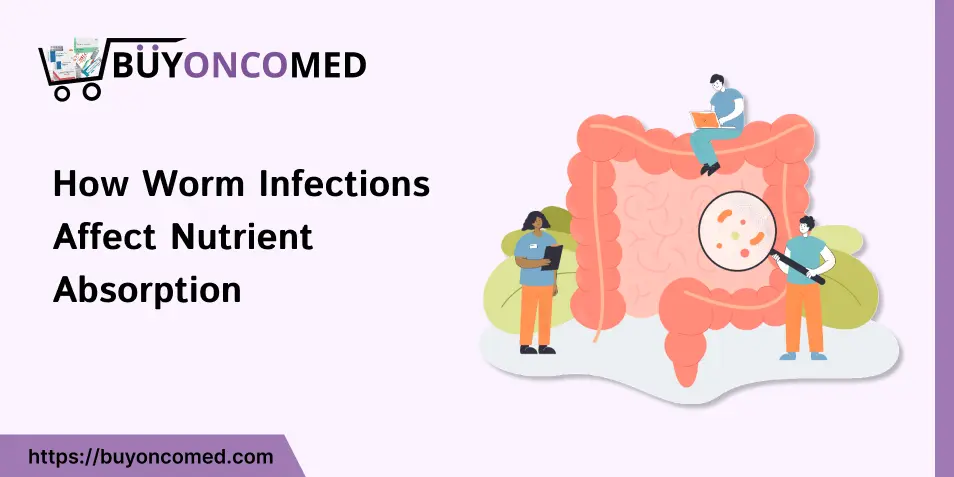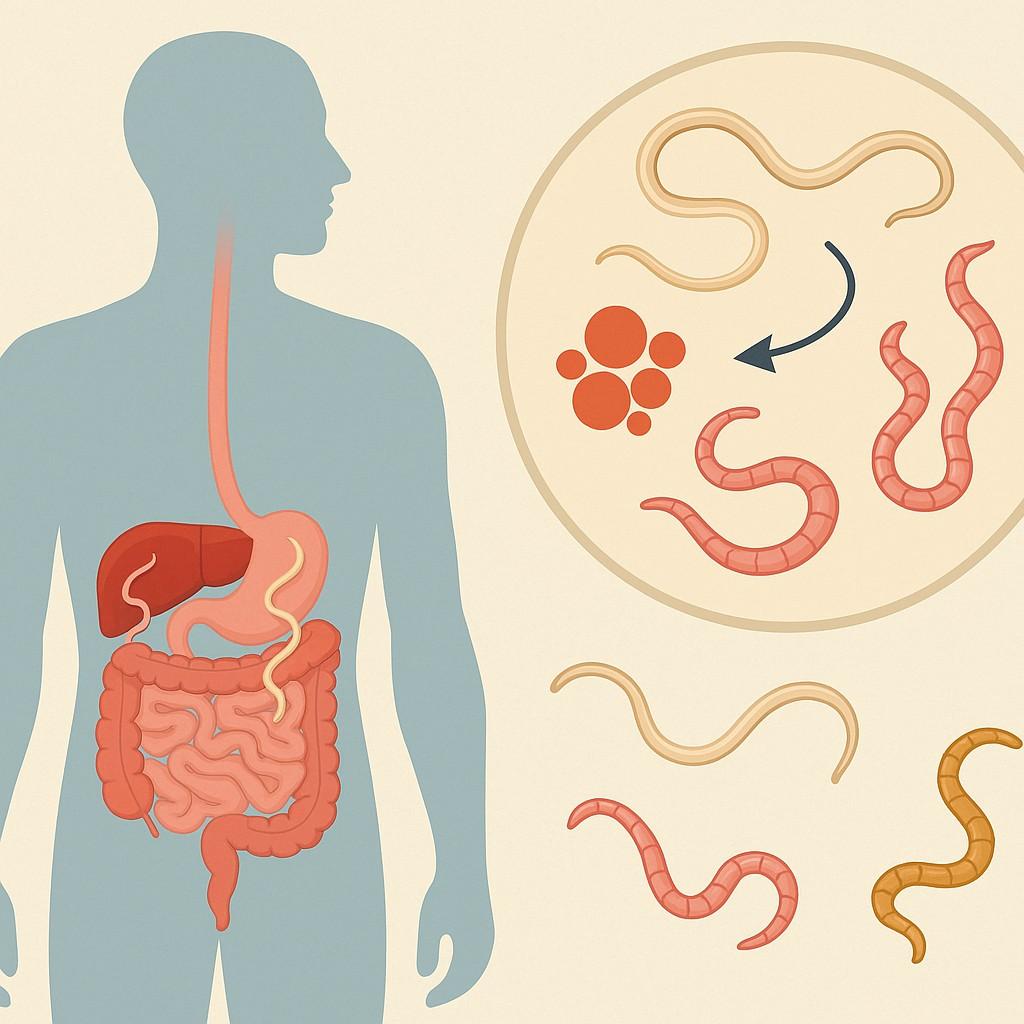
What Are Worm Infections?
Worm infections, also called intestinal worm infections, happen when tiny worms (like roundworms, hookworms, or whipworms) live inside a person’s stomach or intestines. These are a type of parasite. They are more common in places with warm weather and poor sanitation, but anyone, anywhere, can get them.
Worms get into the body when people eat or drink something dirty, walk barefoot on contaminated soil, or touch their mouths after touching dirty things. Children are especially at risk, but adults can get them too. These infections are a big problem in many areas, including rural parts of Asia, Africa, and South America.
How Worms Stop Your Body From Getting Enough Nutrients

➡️ Physical Damage To The Gut
Worms bite and attach themselves to the walls of your intestines. This damages tiny hair-like structures called villi that help absorb nutrients. When villi are hurt, your body cannot absorb as many vitamins, minerals, or protein from food.
➡️ Worms Eat The Food First
Some worms eat your food before your body can use it. For example, hookworms suck blood from the gut wall, which means less iron and protein for you. This often leads to tiredness, pale skin, and slow growth in kids.
➡️ Enzyme Problems And Gut Flora Changes
Worms mess with the natural chemicals (enzymes) your body makes to break down food. They can also change the mix of good bacteria in your stomach. Both things make it harder to absorb nutrients.
➡️ Diarrhea And Fast Gut Transit
Worms often cause diarrhea. When food moves too quickly through the intestines, the body doesn’t have enough time to pull out all the nutrients. This means important vitamins, minerals, and water are lost.
Which Nutrients Are Most Affected by Worms?
Different worms cause different problems. Here’s how:
➡️ Hookworm: Iron And Protein Problems
Hookworms drink blood from the gut, which leads to blood loss. Over time, this can cause anemia (not enough healthy red blood cells) and protein shortages.
➡️ Ascaris: Fat And Vitamin A
Roundworms like Ascaris block parts of the gut and stop the body from absorbing fat and vitamin A. Not enough vitamin A can make it hard to see in the dark and make kids more likely to get sick.
➡️ Whipworm: Growth And Learning
Whipworms hurt the gut lining and make it harder for kids to grow. Kids with whipworm infections may be shorter and do worse in school.
What Happens When The Body Doesn’t Get Enough Nutrients?
Missing out on vitamins, protein, or minerals affects the whole body. Here’s what can happen:
➡️ Feeling Tired And Weak
When the body doesn’t have enough iron or protein, people feel tired all the time. Children may not want to play. Adults may find it hard to work.
➡️ Trouble Fighting Off Sickness
Without the right nutrients, the body cannot fight off viruses or bacteria. This means people with worm infections often get sick more often.
➡️ Problems Growing And Learning
Kids who don’t get enough nutrients can’t grow properly. They may be shorter than others their age. Learning in school may be harder, too.
➡️ Issues In Pregnancy
Pregnant women with worm infections can have babies who are too small or born too early. They themselves may also become weaker and sicker.
How Do You Know If Worms Are The Problem?
Some signs include:
- Tummy pain
- Diarrhea
- Weight loss
- Itching around the bottom
- Feeling tired
Doctors may ask for a stool (poop) test to check for worms or their eggs. Blood tests might show if you have anemia.

How To Treat Worm Infections And Get Your Strength Back
Treating worms is simple in most cases.
💊 Medicines
Doctors give pills like albendazole 400 Mg or mebendazole 500 Mg to kill the worms. These are called deworming medicines. In most countries, kids get these pills at school once or twice a year.
🥗 Eating The Right Foods
After the worms are gone, it’s important to eat foods rich in iron (like eggs, meat, leafy greens), protein (like beans, fish), and vitamins (like fruits and veggies). Sometimes doctors also give vitamins or iron supplements.
✨ Keeping Clean
Washing hands with soap, wearing shoes outside, drinking safe water, and using toilets can stop worms from coming back.
🏠 Local Support And Service Areas
In many cities and rural towns, health centers run regular deworming programs. If you live in places with high rates of worm infections, check with your local clinic about free deworming days.
How To Stop Worms From Coming Back
- Take part in community deworming programs
- Use clean toilets
- Drink safe water
- Wash your hands before eating and after using the toilet
- Make sure children wear shoes outside
Ask your local health worker about upcoming deworming campaigns in your area!
FAQs
1. Can Worm Infections Cause Anemia?
Yes. Hookworms, especially, suck blood, leading to iron deficiency and anemia.
2. How Soon Will I Feel Better After Treatment?
Most people feel better within days. Energy levels usually improve as soon as the worms are gone and you start eating well again.
3. Which Vitamins Are Lost Because Of Worms?
Worms mostly cause problems with iron, vitamin A, zinc, and protein.
4. Are Children More At Risk Than Adults?
Yes. Children are growing and need more nutrients. Worm infections can slow growth and affect learning.
5. How Important Is Hygiene In Preventing Worms?
Very! Clean hands, safe water, and using toilets are the best ways to keep worms away.
💁♂️ Final Tips: Protect Yourself And Your Family
Worm infections can make people tired, weak, and sick. They steal your body’s nutrients to grow, learn, and stay healthy. Simple habits—washing hands, eating the right foods, and taking medicine—can make a huge difference.

